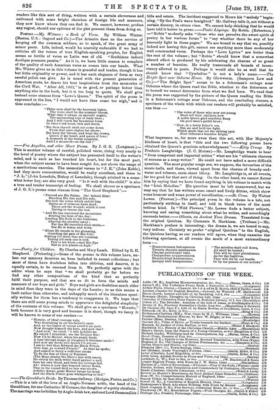—The Geraldine's Bride. By Thomas Gallwey. (Hodges, Foster, and Co.)
—This is a tale of the love of an Anglo-Norman noble, the head of the Geraldines, for one Catherine M'Cormac, the daughter of a petty chieftain. The marriage was forbidden by Anglo-Irish law, and cost Lord Desmond his title and estate. The incident suggested to Moore his "melody" begin- ning, "By the Fears wave benighted." Mr. Gallwey tells it not without a certain fluency, in ottatm rima. We cannot help thinking that he would have told it better in prose.—Poetic Lispings. By Robin. (Robertson.) —"Robin" modestly asks "those who can perceive the sweet spirit of poetry in her various forms" to "say whether there be any of her heavenly light in these pages." We are bound to say that we, possibly indeed not having this gift, cannot see anything more than moderately well constructed verse. Perhaps the "Love Lyrics" are better than the rest of the volume ; but "Robin" should know that a somewhat absurd effect is produced by his celebrating the charms of so great a number of beauties. He really transcends all bounds of incon- stancy allowed to poets. Perhaps it would also be as well that he should know that " Cymbeline " is not a lady's name.—The Bright Spot near Osborne House. By Glowworm. (Sampson Low and Co.)—" The Bright Spot" seems to be a fisherman's cottage near Osborne where the Queen read the Bible, whether to the fisherman or to herself we cannot determine from what we find here. We read that the poem was suggested by the picture of the Queen reading the Bible in a fisherman's cottage near Osborne, and the concluding stanzas, a specimen of the whole with which our readers will probably be satisfied, run thus :—
"The voice of these who now are young Shall tell their children how A noble Queen glad sunshine flung On poor man's pallid brow ; "How, in a lowly fisher's cot, She sat and held the light,
Which made that cot the shining spot
Near Osbonae's beauties bright."
What impresses us, far more even than this act, with Her Majesty's kindness of heart, is that "this and the two following poems have obtained the Queen's gracious acknowledgment."—Kiity Crump. By Frederic Langbridge. (J. C. Hotten)—Mr. Langbridge wants to hear "from competent and impartial critics" what are his "ultimate chances of success as a song-writer." He could not have asked a more difficult question. The most popular songs are, we suppose, the favourites of the music-halls, and these, viewed apart from the charms of brandy-and- water and tobacco, seem sheer idiocy. Mr. Langbridge is, at all events, far too good for that sort of thing. On the other hand, we cannot flatter him by saying that we have found anything in his volume to match with the "Irish Melodies." His question must be loft unanswered, but we may say that he has written some smart and lively ditties, which show some humour and some power of versification.--St. Cross. By Walter Lewes. (Provost.)—The principal poem in the volume is a tale, not particularly striking in itself, and told in blank verse of the most tedious kind. In "Wild Flowers," Mr. Lewes finds a better subject, knowing and caring something about what he writes, and accordingly succeeds better.— 011anta, an Ancient Yrica Drama. Translated from the original Quichua. By Clements R. Markham. (Trfibner.)--Mr. Markham's preface is interesting ; the drama is, we are bound to say, very tedious. Certainly we prefer "original Quichua " to the English, the Quichna having, as our readers will agree, when they examine the following specimen, at all events the merit of a most extraordinary form :— "Huanceacnnam hnicupances. 'The missiles shall roll down,
Tucuyta clutypin ppampanca All shall be buried ; Chaymi paieunapac tumi. This will be their punishment.
Chaypachan ayqquecunacca, As for the fugitives, Maquinchispi huatumccaca They will die by our hands,
Quespiy attic huacatincona." Or by the poison of our arrows."


































 Previous page
Previous page